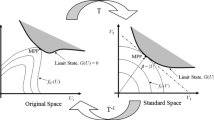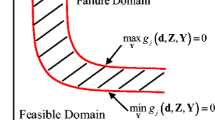Abstract
Probabilistic analytical target cascading (PATC) has been developed to incorporate uncertainty of random variables in a hierarchical multilevel system using the framework of ATC. In the decomposed ATC structure, consistency between linked subsystems has to be guaranteed through individual subsystem optimizations employing special coordination strategies such as augmented Lagrangian coordination (ALC). However, the consistency in PATC has to be attained exploiting uncertainty quantification and propagation of interrelated linking variables that are the major concern of PATC and uncertainty-based multidisciplinary design optimization (UMDO). In previous studies, the consistency of linking variables is assured by matching statistical moments under the normality assumption. However, it can induce significant error when the linking variable to be quantified is highly nonlinear and non-normal. In addition, reliability estimated from statistical moments may be inaccurate in each optimization of the subsystem. To tackle the challenges, we propose the sampling-based PATC using multivariate kernel density estimation (KDE). The framework of reliability-based design optimization (RBDO) using sampling methods is adopted in individual optimizations of subsystems in the presence of uncertainty. The uncertainty quantification of linking variables equivalent to intermediate random responses can be achieved by multivariate KDE to account for correlation between linking variables. The constructed KDE based on finite samples of the linking variables can provide accurate statistical representations to linked subsystems and thus be utilized as probability density function (PDF) of linking variables in individual sampling-based RBDOs. Stochastic sensitivity analysis with respect to multivariate KDE is further developed to provide an accurate sensitivity of reliability during the RBDO. The proposed sampling-based PATC using KDE facilitates efficient and accurate procedures to obtain a system optimum in PATC, and the mathematical examples and roof assembly optimization using finite element analysis (FEA) are used to demonstrate the effectiveness of the proposed approach.










Similar content being viewed by others
References
Adhikari S (2004) Reliability analysis using parabolic failure surface approximation. J Eng Mech 130(12):1407–1427
Alexandrov NM, Lewis RM (2002) Analytical and computational aspects of collaborative optimization for multidisciplinary design. AIAA J 40(2):301–309
Allison JT, Kokkolaras M, Papalambros PY (2009) Optimal partitioning and coordination decisions in decomposition-based design optimization. J Mech Des 131(8):081008
Bae S, Kim NH, Jang SG (2018) Reliability-based design optimization under sampling uncertainty: shifting design versus sha** uncertainty. Struct Multidiscip Optim 57(5):1845–1855
Bayrak AE, Kang N, Papalambros PY (2016) Decomposition-based design optimization of hybrid electric powertrain architectures: simultaneous configuration and sizing design. J Mech Des 138(7):071405
Chen S (2015) Optimal bandwidth selection for kernel density functionals estimation. Journal of Probability and Statistics, 2015
Chen YC (2017) A tutorial on kernel density estimation and recent advances. Biostat Epidemiol 1(1):161–187
Chen Z, Qiu H, Gao L, Li X, Li P (2014) A local adaptive sampling method for reliability-based design optimization using Kriging model. Struct Multidiscip Optim 49(3):401–416
Cho H, Choi KK, Lee I, Lamb D (2016a) Design sensitivity method for sampling-based RBDO with varying standard deviation. J Mech Des 138(1):011405
Cho SG, Jang J, Kim S, Park S, Lee TH, Lee M et al (2016b) Nonparametric approach for uncertainty-based multidisciplinary design optimization considering limited data. Struct Multidiscip Optim 54(6):1671–1688
Denny M (2001) Introduction to importance sampling in rare-event simulations. Eur J Phys 22(4):403
Du X, Chen W (2001) A most probable point-based method for efficient uncertainty analysis. J Des Manuf Autom 4(1):47–66
Dubourg V, Sudret B, Bourinet JM (2011) Reliability-based design optimization using kriging surrogates and subset simulation. Struct Multidiscip Optim 44(5):673–690
Duong T & Hazelton ML (2005) Cross‐validation bandwidth matrices for multivariate kernel density estimation. Scandinavian Journal of Statistics, 32(3):485–506
Han J, Papalambros PY (2010) A sequential linear programming coordination algorithm for analytical target cascading. J Mech Des 132(2):021003
Jung Y, Kang N, Lee I (2018) Modified augmented Lagrangian coordination and alternating direction method of multipliers with parallelization in non-hierarchical analytical target cascading. Struct Multidiscip Optim 58(2):555–573
Jung Y, Cho H, Lee I (2019) MPP-based approximated DRM (ADRM) using simplified bivariate approximation with linear regression. Struct Multidiscip Optim 59(5):1761–1773
Kang N, Kokkolaras M, Papalambros PY (2014a) Solving multiobjective optimization problems using quasi-separable MDO formulations and analytical target cascading. Struct Multidiscip Optim 50(5):849–859
Kang N, Kokkolaras M, Papalambros PY, Yoo S, Na W, Park J, Featherman D (2014b) Optimal design of commercial vehicle systems using analytical target cascading. Struct Multidiscip Optim 50(6):1103–1114
Kang K, Qin C, Lee B, Lee I (2019) Modified screening-based Kriging method with cross validation and application to engineering design. Appl Math Model 70:626–642
Kim HM, Rideout DG, Papalambros PY, Stein JL (2003) Analytical target cascading in automotive vehicle design. J Mech Des 125(3):481–489
Kim HM, Chen W, Wiecek MM (2006) Lagrangian coordination for enhancing the convergence of analytical target cascading. AIAA J 44(10):2197–2207
Kokkolaras M, Louca L, Delagrammatikas G, Michelena N, Filipi Z, Papalambros P et al (2004) Simulation-based optimal design of heavy trucks by model-based decomposition: An extensive analytical target cascading case study. Int J Heavy Vehicle Syst 11(3-4):403–433
Kokkolaras M, Mourelatos ZP, Papalambros PY (2006) Design optimization of hierarchically decomposed multilevel systems under uncertainty. J Mech Des 128(2):503–508
Lee TH, Jung JJ (2008) A sampling technique enhancing accuracy and efficiency of metamodel-based RBDO: Constraint boundary sampling. Comput Struct 86(13):1463–1476
Lee I, Choi KK, Noh Y, Zhao L, Gorsich D (2011) Sampling-based stochastic sensitivity analysis using score functions for RBDO problems with correlated random variables. J Mech Des 133(2):021003
Lee I, Noh Y, Yoo D (2012) A novel second-order reliability method (SORM) using noncentral or generalized chi-squared distributions. J Mech Des 134(10):100912
Lim J, Lee B, Lee I (2014) Second-order reliability method-based inverse reliability analysis using Hessian update for accurate and efficient reliability-based design optimization. Int J Numer Methods Eng 100(10):773–792
Liu H, Chen W, Kokkolaras M, Papalambros PY, Kim HM (2006) Probabilistic analytical target cascading: a moment matching formulation for multilevel optimization under uncertainty. J Mech Des 128(4):991–1000
Martins JR, Lambe AB (2013) Multidisciplinary design optimization: a survey of architectures. AIAA J 51(9):2049–2075
Michelena N, Park H, Papalambros PY (2003) Convergence properties of analytical target cascading. AIAA J 41(5):897–905
Ouyang Q, Chen X, Yao W (2014) Sequential probabilistic analytical target cascading method for hierarchical multilevel optimization under uncertainty. Struct Multidiscip Optim 49(2):267–280
Ouyang Q, Yao W, Chen X (2018) Mixed uncertainty based analytical target cascading: an approach for hierarchical multilevel optimization under probabilistic and interval mixed uncertainties. Struct Multidiscip Optim 57(4):1475–1493
Papalambros PY, Wilde DJ (2017) Principles of optimal design: modeling and computation. Cambridge university press
Rubinstein RY, Kroese DP (2016) Simulation and the Monte Carlo method (Vol. 10). John Wiley & Sons
Silverman BW (2018) Density estimation for statistics and data analysis. Routledge
Shan S, & Wang GG (2010) Survey of modeling and optimization strategies to solve high-dimensional design problems with computationally-expensive black-box functions. Structural and Multidisciplinary Optimization 41(2):219–241
Tosserams S, Etman LFP, Papalambros PY, Rooda JE (2006) An augmented Lagrangian relaxation for analytical target cascading using the alternating direction method of multipliers. Struct Multidiscip Optim 31(3):176–189
Tosserams S, Etman LFP, Rooda JE (2008) Augmented Lagrangian coordination for distributed optimal design in MDO. Int J Numer Methods Eng 73(13):1885–1910
Tosserams S, Kokkolaras M, Etman LFP, Rooda JE (2010) A nonhierarchical formulation of analytical target cascading. J Mech Des 132(5):051002
Tu J, Choi KK, Park YH (1999) A new study on reliability-based design optimization. J Mech Des 121(4):557–564
**ong F, Yin X, Chen W, Yang S (2010) Enhanced probabilistic analytical target cascading with application to multi-scale design. Eng Optim 42(6):581–592
Yao W, Chen X, Luo W, van Tooren M, Guo J (2011) Review of uncertainty-based multidisciplinary design optimization methods for aerospace vehicles. Prog Aerosp Sci 47(6):450–479
Zougab N, Adjabi S & Kokonendji CC (2014) Bayesian estimation of adaptive bandwidth matrices in multivariate kernel density estimation. Computational Statistics & Data Analysis, 75:28–38
Funding
This research was supported by the development of thermoelectric power generation system and business model utilizing non-use heat of industry funded by the Korea Institute of Energy Technology Evaluation and Planning (KETEP) and the Ministry of Trade Industry & Energy (MOTIE) of the Republic of Korea (No. 20172010000830) and the National Research Foundation of Korea (NRF) grant funded by the Korean government (NRF-2017R1C1B2005266).
Author information
Authors and Affiliations
Corresponding authors
Ethics declarations
Conflict of interest
The authors declare that they have no conflict of interest.
Replication of results
Matlab codes for the 3-dimensional and 10-dimensional mathematical examples in Section 4 are uploaded on https://github.com/Yongsu-Jung/SMO_PATC.git. Unfortunately, the engineering optimization is related to FEA models that are restricted so that it cannot be shared. Overall concepts and algorithms can be validated through the mathematical example.
Additional information
Responsible Editor: Raphael Haftka
Publisher’s note
Springer Nature remains neutral with regard to jurisdictional claims in published maps and institutional affiliations.
Rights and permissions
About this article
Cite this article
Jung, Y., Lee, J., Lee, M. et al. Probabilistic analytical target cascading using kernel density estimation for accurate uncertainty propagation. Struct Multidisc Optim 61, 2077–2095 (2020). https://doi.org/10.1007/s00158-019-02455-9
Received:
Revised:
Accepted:
Published:
Issue Date:
DOI: https://doi.org/10.1007/s00158-019-02455-9




